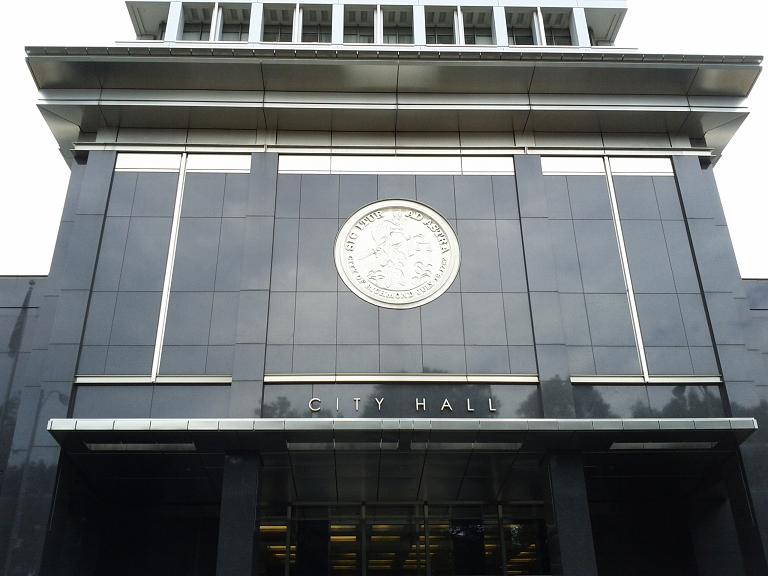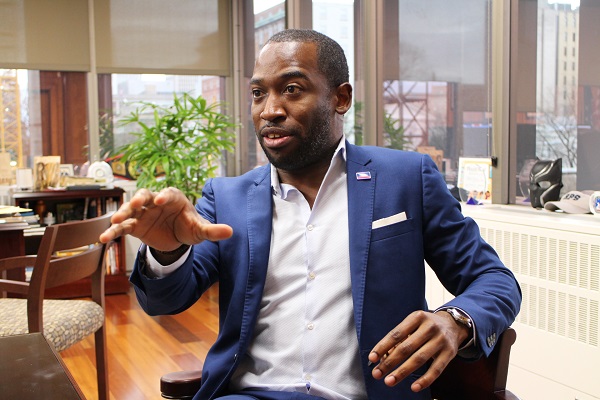
Richmond is weighing an increase to the BPOL tax exemption threshold for businesses. (BizSense file)
Looking to keep pace with neighboring counties and lessen the city’s tax burden on small businesses, Richmond officials are weighing a tax exemption adjustment that could affect more than half of the businesses operating in the city.
A proposal from Councilmember Andreas Addison, with support from Mayor Levar Stoney’s administration, would increase the city’s exemption threshold for Business, Professional and Occupational License taxes.
The adjustment would raise the annual revenue threshold from $100,000 to $250,000, meaning businesses’ first $250,000 in gross taxable receipts would be exempt from the city’s BPOL tax rate of up to 58 cents per $100. The city’s rate varies from around 20 cents for retailers, wholesalers and contractors, to 58 cents for business, professional and financial services.
The proposal, to be introduced to the City Council today, would follow similar moves made in recent years by Richmond’s neighboring municipalities. Incremental increases over the past several years have brought Henrico County’s threshold to $500,000, while Chesterfield’s currently stands at $400,000.
Addison, who initially sought an adjustment over the past year through a reduction to the BPOL tax rates, said the increase to the exemption threshold would be a first step in what’s envisioned to be similar incremental adjustments over time, with an ultimate goal of bringing the rate more in line with the counties, which currently stand at about one-third the city’s rate.
“Small businesses are the life and blood of our city,” said Addison, who represents the First District in the city’s West End. “The original proposal was a reduced tax rate that proved to be a little bit more complicated than just simply changing the numbers.”
He added, “Elevating the threshold had a bigger impact,” noting that 60 percent of businesses in the city would fall under the threshold.
“Not only that, it’s a plan for us to look at matching the counties and getting it up to $500,000 for that minimum threshold over time. This is a big step in that direction of pushing us to be competitive.”
Stoney, who is joining Addison in supporting this latest version of the proposal, said the increase would result in those 60 percent of businesses paying either no fee or a $30 flat fee. If approved by the council, the increase would take effect Jan. 1, 2023.
“It’s our goal to raise the threshold eventually in the neighborhood of where Chesterfield and Henrico are currently,” Stoney said. “We’re to use a stairstep process that they used, starting with raising it to $250,000 and with the goal of getting to that neighborhood of $400,000, $500,000 in the coming years.”

Mayor Levar Stoney supports the proposal to increase the BPOL tax exemption threshold for businesses. (BizSense file)
Stoney said the move is aimed at helping businesses recovering from the effects of the pandemic, as well as inflationary impacts that he said have prompted some businesses to relocate out of the city.
“We know how difficult it can be to even start a business, particularly in this climate,” Stoney said. “It is the bravest, most courageous thing you can do, to be an entrepreneur and hang out your own shingle, and we want more of that happening in the city limits. This shows our businesses and our residents that we seek to be a business-friendly city and we appreciate what they do for our city.”
Addison added that the exemption would amount to about $100 a month in tax relief for qualifying businesses.
“We’re trying to make sure that people have that money to reinvest, to offer more services, to potentially hire more people or work on better salaries,” he said.
Addison said the proposal has support from his colleagues on the council. He said he’s aiming for it be approved ahead of the council’s budget deliberations for next fiscal year that get underway next month.

Richmond is weighing an increase to the BPOL tax exemption threshold for businesses. (BizSense file)
Looking to keep pace with neighboring counties and lessen the city’s tax burden on small businesses, Richmond officials are weighing a tax exemption adjustment that could affect more than half of the businesses operating in the city.
A proposal from Councilmember Andreas Addison, with support from Mayor Levar Stoney’s administration, would increase the city’s exemption threshold for Business, Professional and Occupational License taxes.
The adjustment would raise the annual revenue threshold from $100,000 to $250,000, meaning businesses’ first $250,000 in gross taxable receipts would be exempt from the city’s BPOL tax rate of up to 58 cents per $100. The city’s rate varies from around 20 cents for retailers, wholesalers and contractors, to 58 cents for business, professional and financial services.
The proposal, to be introduced to the City Council today, would follow similar moves made in recent years by Richmond’s neighboring municipalities. Incremental increases over the past several years have brought Henrico County’s threshold to $500,000, while Chesterfield’s currently stands at $400,000.
Addison, who initially sought an adjustment over the past year through a reduction to the BPOL tax rates, said the increase to the exemption threshold would be a first step in what’s envisioned to be similar incremental adjustments over time, with an ultimate goal of bringing the rate more in line with the counties, which currently stand at about one-third the city’s rate.
“Small businesses are the life and blood of our city,” said Addison, who represents the First District in the city’s West End. “The original proposal was a reduced tax rate that proved to be a little bit more complicated than just simply changing the numbers.”
He added, “Elevating the threshold had a bigger impact,” noting that 60 percent of businesses in the city would fall under the threshold.
“Not only that, it’s a plan for us to look at matching the counties and getting it up to $500,000 for that minimum threshold over time. This is a big step in that direction of pushing us to be competitive.”
Stoney, who is joining Addison in supporting this latest version of the proposal, said the increase would result in those 60 percent of businesses paying either no fee or a $30 flat fee. If approved by the council, the increase would take effect Jan. 1, 2023.
“It’s our goal to raise the threshold eventually in the neighborhood of where Chesterfield and Henrico are currently,” Stoney said. “We’re to use a stairstep process that they used, starting with raising it to $250,000 and with the goal of getting to that neighborhood of $400,000, $500,000 in the coming years.”

Mayor Levar Stoney supports the proposal to increase the BPOL tax exemption threshold for businesses. (BizSense file)
Stoney said the move is aimed at helping businesses recovering from the effects of the pandemic, as well as inflationary impacts that he said have prompted some businesses to relocate out of the city.
“We know how difficult it can be to even start a business, particularly in this climate,” Stoney said. “It is the bravest, most courageous thing you can do, to be an entrepreneur and hang out your own shingle, and we want more of that happening in the city limits. This shows our businesses and our residents that we seek to be a business-friendly city and we appreciate what they do for our city.”
Addison added that the exemption would amount to about $100 a month in tax relief for qualifying businesses.
“We’re trying to make sure that people have that money to reinvest, to offer more services, to potentially hire more people or work on better salaries,” he said.
Addison said the proposal has support from his colleagues on the council. He said he’s aiming for it be approved ahead of the council’s budget deliberations for next fiscal year that get underway next month.




The City revenue sources are doing fine and assessments are providing an additional $40MM to the coffers this year alone. The figure will increase again next year. Cut taxes on small businesses so that they’ll return to “Main Street” and revive other areas of the City.
Meanwhile, the real estate tax rate remains at $1.20 per $100. It hasn’t been reduced since 2011, despite skyrocketing assessments. All of the counties are significantly lower.
I don’t know are we sure the War of 1812 is really paid for? Proof that taxes never go away..
This article is missing a key piece of the math here – while a professional business with $90k of revenue only pays a $30 fee (as its under the $100k cap), a professional business with $110k in revenues based in the city pays 0.58% tax on the entire $110k of revenue, or $638. In Chesterfield, their threshold is $400k, and their tax rate of 0.20% is only charged on revenues above $400k. For small businesses or self employed consultants, this is a huge deal. Richmond needs to get competitive if it wants to retain small businesses and consultants like me… Read more »